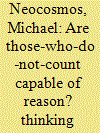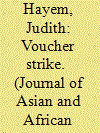| Srl | Item |
| 1 |
ID:
117771


|
|
|
|
|
| Publication |
2012.
|
| Summary/Abstract |
This article is concerned to show that the historical science of the (neo-)colonial world is unable to allow for an analysis of the political subjectivities of 'those-who-do-not-count' or 'subalterns' as rational beings. Rather, it can only think such subjectivities as the products of people who are merely bearers of their social location, not thinking subjects. As a result, such history can only be a history of place, not a history of the transcending of place; it therefore amounts to colonial or state history. Historical objectivity invariably produces state history. The thought of the possibility of emancipatory politics, which always exceeds place, is thus precluded. This is an unavoidable epistemic problem in history and the social sciences in their current form. Following the work of Lazarus, I argue for an alternative historical methodology in Africa in terms of an internal analysis of the idioms of politics as discontinuous subjective sequences.
|
|
|
|
|
|
|
|
|
|
|
|
|
|
|
|
| 2 |
ID:
117770


|
|
|
|
|
| Publication |
2012.
|
| Summary/Abstract |
The article presents an anthropological case study of workers' forms of thinking and subjectivity as they appeared at Autofirst, during a strike which took place in December 1998, in South Africa. After conceptualizing my approach as a 'post-classist' analysis following the work of the French political anthropologist Sylvain Lazarus and presenting my methodology, I focus on the problematic word 'happy' and its meaning in the specific subjective sequence. I show how the interviewees' prescriptions that 'a happy worker is a quality worker' and that 'the worker should be happy' as much as management, are indications of the workers' own logic and vision on what is possible in the factory in terms of relationships between management and workforce, during the early post-apartheid period. I contend that a 'classist' vision of capital and labour would not allow us to comprehend the issues at stake in the strike and in South African industry as a whole at that particular moment in time. Finally, I demonstrate the sequential existence of the factory as a place of engagement and of communication between 1995 and 1998, in contrast to the 'apartheid of speech' which, from the workers' point of view, had previously characterized it.
|
|
|
|
|
|
|
|
|
|
|
|
|
|
|
|